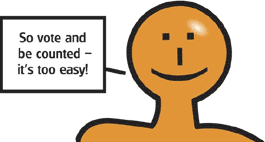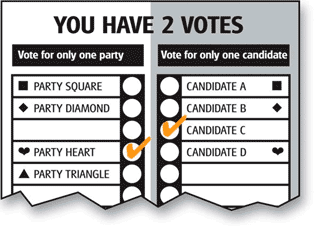Saturday, August 20, 2005
democracy is hard work



Ever since the infamous "butterfly ballot" in the US 2000 presidential election, usability professionals have taken a keen interest in elections.
New Zealand will hold parliamentary elections next month, and I have been interested to read a number of people mention that many voters are "confused" about how the NZ voting system works in practice. The confusion rests not with a ballot per se, but how the ballots are counted and what consequences result.
About a decade ago, New Zealand adopted a voting system known as MMP, which gives people two votes, one for a member of parliament, another for a political party. After the last election, a government commissioned survey (2003) found that only half of voters understood that the party vote determines the composition of parliament.
A Recent survey shows understanding is improving, but still falling short of what is ideal.
- for every two people who say they find MMP easy to understand, one says they find it difficult to understand
- 25% of people incorrectly believe that their electorate vote determines the share of seats parties have in parliament.
- 70% don't understand what "threshold" a political party needs to be included in parliament.
- less than 20% understand all the major components of the MMP system: they either cannot correctly identify the party vote as the one that determines the share for each party in Parliament and/or both parts of the threshold.
From the perspective of usability, MMP can be considered according the following criteria found in ISO 9241:
- Task adequacy: are there any unnecessary steps in the MMP election formula?
- Self-descriptiveness: is it transparent to voters how the government is formed? MMP has some distinctive features such as "list" candidates who can become members of parliament without standing for electorate seat.
- Controllability: do voters fell they are in control of the outcome?
- Conformity to user expectations: does MMP correspond to how voters imagine elections work?
- Error tolerance: What happens when a voter votes for someone who switches coalition alliances?
- Flexibility: MMP is a new system. Will it ever be modified, or is it set?
- Learnability: as NZ voters gain more experience with MMP, will they understand it better?
I'm not sure any voting system would satisfy all the above criteria, which were never meant to evaluate voting systems, but it is interesting to ask the questions. Democracy is hard work.
